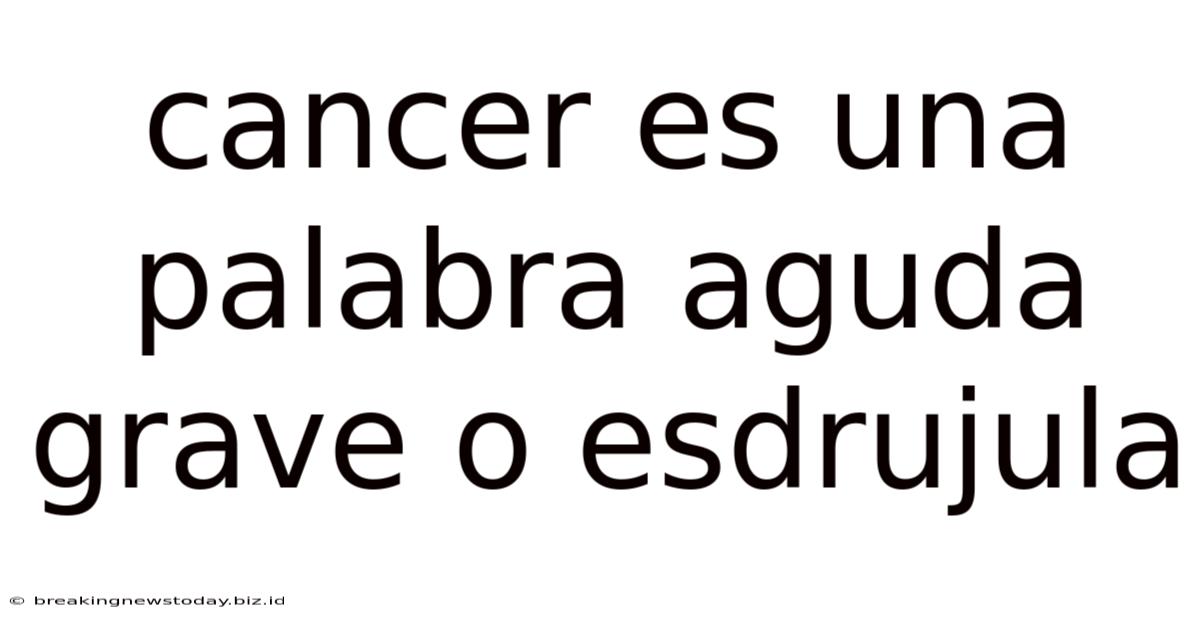Cancer Es Una Palabra Aguda Grave O Esdrujula
Breaking News Today
Jun 08, 2025 · 4 min read

Table of Contents
Cancer: Aguda, Grave, or Esdrújula? Understanding Spanish Word Stress
The question of whether "cáncer" is an aguda, grave, or esdrújula word in Spanish hinges on understanding Spanish syllable stress rules. Let's delve into the intricacies of Spanish pronunciation and classification to definitively answer this question and, along the way, clarify the concepts of aguda, grave, and esdrújula words.
Understanding Spanish Syllable Stress
Spanish, unlike some other languages, doesn't always follow predictable patterns for syllable stress. While many words stress the penultimate syllable (grave), others deviate, requiring a keen understanding of the rules and exceptions. This is crucial for proper pronunciation and comprehension. The three main categories are:
-
Agudas (Acute): Words stressed on the final syllable. These words typically end in a vowel, -n, or -s. They often receive an accent mark (´) if the stress falls on the last syllable and the word doesn't end in a vowel, -n, or -s.
-
Graves (Grave): Words stressed on the penultimate syllable (the second-to-last syllable). This is the most common stress pattern in Spanish. They generally don't require an accent mark unless there's a need for clarity or to distinguish from a similar word.
-
Esdrújulas (Esdrújula): Words stressed on the antepenultimate syllable (the third-to-last syllable). These words always receive an accent mark (´) to indicate the stress.
Analyzing "Cáncer"
Now, let's examine the word "cáncer." The pronunciation is crucial here. We pronounce it as "cán-cer," with the stress falling on the first syllable.
Because the stress falls on the first syllable, which is not the final, penultimate, or antepenultimate syllable, the word "cáncer" is categorized as aguda (acute). However, since it doesn't fit into the typical agudas' endings (vowels, -n, -s), it requires the accent mark to correctly indicate the stress on the first syllable. Without the accent, it would be incorrectly pronounced as "can-CER."
The Importance of Accent Marks in Spanish
The accent mark (´) is not merely a stylistic choice; it's essential for accurate pronunciation and understanding in Spanish. It's a crucial component of the orthography, distinguishing between words that might be spelled the same but have different meanings or pronunciations. Consider these examples:
- Palabras agudas: árbol (tree), ciudad (city), también (also), camión (truck)
- Palabras graves: casa (house), libro (book), mesa (table), gato (cat)
- Palabras esdrújulas: música (music), fácilmente (easily), cárcel (jail) árboles (trees)
The accent mark in "cáncer" is vital to avoid confusion. Without it, the word would be misinterpreted and mispronounced.
Further Examples and Clarifications
To further solidify our understanding, let's examine some other examples and address potential points of confusion.
More Examples of Acute Words:
- Café: Pronounced with the stress on the final syllable.
- Sofá: Similar stress pattern to café.
- Revólver: This word also follows the acute pattern.
Cases where the Stress is Misleading:
Sometimes, the length of the word or the presence of diphthongs and triphthongs can make determining the stress a bit more complicated, but the underlying rules still apply.
Disambiguating with Accent Marks:
Accent marks are often critical in distinguishing between different word categories:
- Palabras agudas: Without the accent mark, “cancer” would be pronounced with stress on the final syllable.
Practical Applications and Implications
Knowing the classification of words like "cáncer" is essential for:
- Correct Pronunciation: Ensuring you say words correctly in conversation.
- Reading Comprehension: Understanding the intended stress and pronunciation when reading written Spanish.
- Writing Accuracy: Properly using accent marks to convey the intended pronunciation.
- Avoiding Misunderstandings: Clarity in communication is crucial, and correct pronunciation is key.
Conclusion: "Cáncer" is an Aguda Word
To reiterate, "cáncer" is classified as an aguda (acute) word in Spanish because the stress falls on the final syllable. However, due to its irregular ending, the accent mark is compulsory to clearly indicate this stress, differentiating it from a possible grave pronunciation. Mastering the nuances of Spanish syllable stress and accent marks is fundamental to effective communication and understanding the language. By understanding the rules governing agudas, graves, and esdrújulas, you can confidently navigate the complexities of Spanish pronunciation and orthography. The correct use of accents is fundamental to fluent Spanish, ensuring clear communication and accurate understanding. Remember, consistent practice and attention to detail are key to mastering these essential aspects of Spanish grammar and pronunciation.
Latest Posts
Latest Posts
-
Determine Whether The Given Figure Tessellates The Plane
Jun 08, 2025
-
Luke Has Blue And Red Balls
Jun 08, 2025
-
Very Helpful Pages For A Dominant Interpretation
Jun 08, 2025
-
1 25 Moles Of Pbo2 Have A Mass Of
Jun 08, 2025
-
How Is 10 Ounces Written Using Apothecary Abbreviations
Jun 08, 2025
Related Post
Thank you for visiting our website which covers about Cancer Es Una Palabra Aguda Grave O Esdrujula . We hope the information provided has been useful to you. Feel free to contact us if you have any questions or need further assistance. See you next time and don't miss to bookmark.